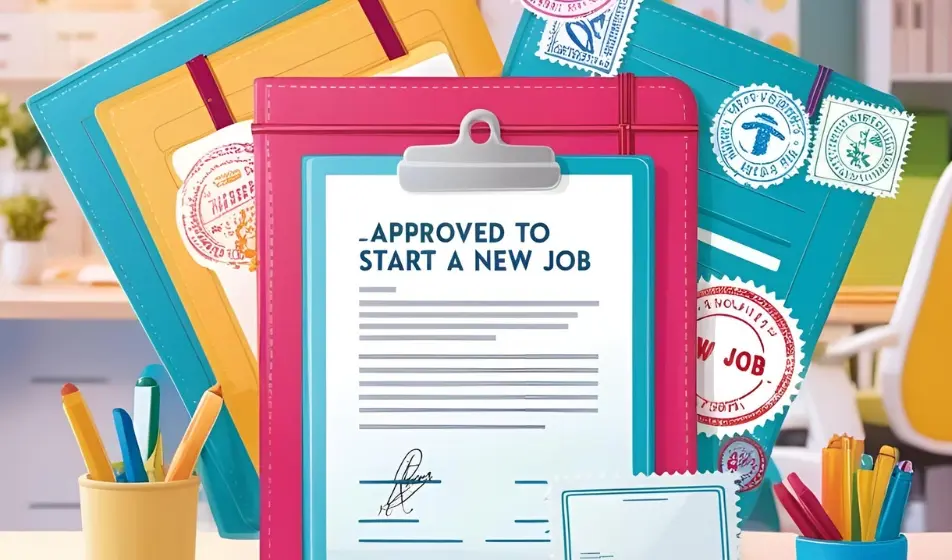When employees start a new job in the UK, they almost always have a probation period built into their contract.
But what is a probation period? What does it need to include? And how do SMEs create probation terms in a consistent and compliant way? In this blog, we discuss the key details.
What is a probation period?
A probation period is a trial period of employment, which often takes place when a new hire first joins the company. During this period, it's generally much easier for either the organisation or the employee to terminate the contract.
In some cases, they can also be used with existing employees. In practice, however, this tends to be reserved for those who are newly promoted, since they are technically starting a new job role. In this sense, it operates the same as a new employee joining the company for the first time.
Probation periods vary in length, but they typically last between one and six months. For casual workers and those on zero-hours contracts, probation periods may vary, but tend to be shorter.
An employer can choose to withhold certain employee benefits or perks during this period, including private medical insurance, death in service cover, company pension schemes, etc. Since these are not statutory benefits, the employer is entitled to grant them as and when they choose.
When the trial period comes to an end, the company reviews the employee's performance. If they're satisfied, the employee will 'pass' their probation period and continue with standard employment terms from there onwards. Equally, the employee can terminate the employment if they feel the role or the company isn't suitable for them.

Legal requirements of probation periods
There’s no legal requirement to include a probation period in an employment contract in the UK. It’s entirely up to the employer whether to add one, and the terms can vary depending on the role.
That said, legal changes are on the horizon. The Government’s proposed Employment Rights Bill could introduce a statutory probation period and new day-one rights for employees.
We’ve covered what these changes could mean in more detail below: What changes to probation periods are ahead?
Employee rights during probation
Being on probation doesn’t mean employees are without rights.
From day one, they’re entitled to:
-
The national minimum wage
-
Statutory sick pay (if they meet the eligibility criteria)
-
Statutory annual leave
-
Rest breaks and limits on working hours
-
Protection against unlawful discrimination
Some rights, like the ability to claim unfair dismissal, only kick in after two years of continuous service. But others apply immediately. For instance, it’s automatically unfair to dismiss an employee for whistleblowing or for raising a health and safety issue.
The upcoming Employment Rights Bill is expected to expand day-one entitlements even further, like access to statutory sick pay and paternity leave.
Why are probationary periods important for SMEs?
For employers, probation periods offer some time to assess the employee's suitability for the job they've been hired into. You can take the time to evaluate if your new employee is showing the same potential that you identified in them during the application process. If not, the trial period gives you a safety net to terminate the employment.
For employees, the benefits of a probation period are the same. For permanent employees, a notice period is generally required before they can leave the company - usually at least a month. But the probation period gives the employee the opportunity to evaluate if the job lives up to their expectations.
Is a probationary period a statutory requirement?
In short, no. There is currently no legal requirement to have a probation period in your contracts and there is no statutory minimum notice period.
In fact, the idea of a probation period has very little basis in employment law - it's entirely a contractual agreement between the employer and the employee.
This means there is a fair amount of flexibility in the terms you put in the contract and how long it can go on for. In theory, a probation period could last as long as two years, since this is when an employee can currently claim unfair dismissal and other statutory employment rights. In practice, however, a business would have trouble filling a position if this were the case, so probation periods are much more likely to be three to six months.
Crucially, the terms of your probation period cannot impact the employee's statutory rights. Currently, the employee doesn't have many rights on day one of their employment (though this is set to change over the next few years). However, they're still protected against dismissal for 'protected reasons' such as age, ethnicity, disability, religion, gender, etc.
What changes to probation periods are ahead?
As we explained in the last section, employment law currently has very little to say about probation periods. However, this is all set to change.
Currently, the Government's Employment Rights Bill is on its way to becoming law. When it does, a number of statutory rights will be available from day one, including statutory sick pay, unpaid parental leave, paid paternity leave and paid bereavement leave. In practice, this means companies will have to offer these benefits even during the probation period.
As part of the Employment Rights Bill, the Government has also proposed a new approach to unfair dismissal protections. Under the current proposals, there will be a new statutory probation period (likely between six and nine months) under which a 'lighter touch' approach to dismissal will apply. After that, employees will be entitled to full employment rights and protections.
This is different from the current legal framework, in which unfair dismissal protections kick in after two years of employment. As long as full statutory employment rights are given after this period, the employer is at liberty to grant or hold back most protections and rights for any length beforehand. This is regardless of whether a probation period is used or not.
In practice, this means probation periods will become a statutory entitlement for the first time when this becomes law. Regardless of what's in the employment contract, employers will at least have to offer statutory sick pay, etc. from day one, and unfair dismissal rights when the statutory probation period is up.
.webp?width=2240&height=1260&name=Untitled%20design%20(24).webp)
How do you ensure a successful probation period?
The key to a successful probationary period is good performance management from the start. It will take time for a new recruit to fully understand what's expected of them. You can equip employees with the tools for success with providing training and support for them to build their knowledge.
Checking in regularly and providing good communication from the very beginning helps to make expectations clear from the start. It's also a good idea to hold regular review meetings so the employee knows how they are progressing.
They also then have the opportunity to understand if they're meeting the expectations of the role, or if any improvements need to be made. Any concerns can also be aired during these meetings.
Performance management best practices
Probationary periods aren’t just about what’s written in the employment contract—they’re about helping employees get off to a strong start.
Here are a few ways to support someone through their probation:
-
Set expectations early
Outline the job role and what success looks like. -
Check in regularly
These don’t need to be long, but they help build a two-way conversation. -
Be honest, supportive and fair
Talk about what’s going well and what needs work. -
Keep a simple record
Note key points from discussions so you’ve got something to refer back to. -
Hold a formal review
Towards the end of the probation period, you should meet to reflect on progress and agree next steps.
Handled well, a probationary period can boost a new employee’s confidence, strengthen the employment relationship, and give both the employer and the employee a chance to assess if it’s the right long-term fit.
How to include probation periods in your employment contract
Do you use probationary periods at your company?
If not, there are many good reasons to consider adding them to your contracts. A clear, well-defined probationary period clause will protect both you and a new employee in the event that the role and the candidate don't match up as you each had hoped. It also gives you both the chance to test if the employment relationship lives up to your expectations, before fully committing.
Frequently asked questions
Can an employee be dismissed during their probation period?
Yes, but it still needs to be handled fairly. Set expectations clearly from the start and provide regular feedback. If the role isn’t the right fit, follow the notice period set out in the employment contract and ensure the dismissal isn’t discriminatory or based on any protected characteristic.
What happens after the probation period ends?
You’ll usually hold a probation review to assess the employee’s performance. If everything’s gone well, they move onto a permanent contract, often with access to additional non-statutory benefits. If more time is needed, you might extend the probationary period. And if the role isn’t quite right, this is the point where you can end the contract with clarity and care.

Author: Aimée Brougham-Chandler
An IDM-certified Digital Copywriter (2023) & English Language & Literature graduate (BA Hons), Aimée is Breathe's Content Assistant. With 3 years' content marketing experience, Aimée has a passion for writing - and providing SME HR teams with solutions to their problems. She enjoys delving into & demystifying all things HR: from employee performance to health and wellbeing, leave to company culture & much more.




